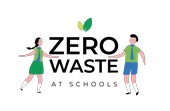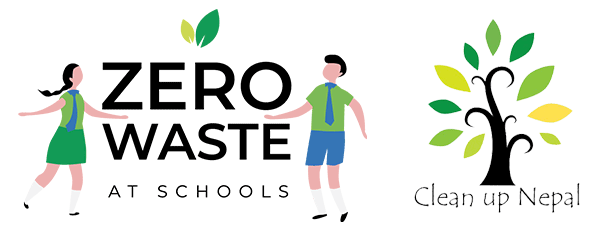Case study: Implementation of Zero Waste at School Initiative
BACKGROUND
With the aim of promoting environmental awareness and sustainable practices, Under RIVER+ project, CLEAN UP NEPAL conducted school awareness programs in Koteshwor Saraswati Secondary School which is a public school in Mahadevstan, koteshwor-Kathmandu. Zero Waste at Schools aimed to promote and implement sustainable waste management practices in schools, extend this knowledge to homes and the broader community, and increase overall sustainable practices related to climate action.
One of the students, Anisha Kumari Mandal, a 5th grade student of Koteshwor Saraswati Secondary School was particularly inspired by the initiative. She is one of the cheerful and most enthusiast participant. She is also among the top 5 best Eco-diary winners. Anisha is 12 years old who lives in Koteshwor. She has 6 members in her family which includes Grandmother, Father, Mother, 2 younger brothers and herself. Her father owns a textile business, and her mother is a housewife. They live in a small, rented flat. Her family moved to kathmandu 2 years back, before that, they all used to live in Bara district. She joined Koteshwor Saraswati School when she was in class 3.
Anisha stated that she and her family were interested in keeping surroundings clean. She would help her mother to clean the house, to clean kitchen garden when she was back at Bara district but now, she said she doesnt must spend much time in cleaning as they dont live in spacious place, she only must clean her house and clean father’s shop. As she is living in kathmandu, she doesnt throw garbages in open air or open places, instead she used single dustbin to throw all types of wastes. Anisha mentioned that her mother and father have started minimizing the use of plastic bags at their home. She was already a member of Eco-Club initiated by the school administration; due to this she ended up enrolling herself in ZWAS session.
Intervention-ZWAS
She attended all the sessions, and she was found to be much more interested in practicing things which she learned in these sessions. She would participate in all waste-related games and activities so that she could learn more from the trainers. She would also make cross questions if she doubted anything. Not only this, but she also always noted what she learnt in each session in her new Eco-diary. She said that she has already started to follow Waste seggregation practice and 3R’s principles of waste management. She has warned her family not to practicing waste-burning in open places, she said that she is trying to take proactive steps to inform family as well as comminity about the bad concequences of doing this. She felt that the last session on waste and climate change was exciting session for her. She said that she learnt a good lesson about the consequenes of poor waste management on our earth. The bingo game we played making a theme of sad earth and happy earth has a lot to learn about climate change and waste management. All the activities in which she participated in last session had a lot teach and learn.
Post intervention-ZWAS
From the session conducted on waste seggregation, she learnt to identify the waste types and how to segregate them. She has been doing this at her school where two different types of bins have been installed. She tries to teach her friends about waste seggregation too, but she is hopeless because only few of them does seggregation and not all of them follow. She even shared this knowledge with her family and now they are seperating the bio-degradable waste from non- biodegradable waste. Although she has asked her father to buy another bin where she can put landfill waste, he hasnt brought any till date, but she said she will have him buy the bin soon so that she can practice the learning at her own home. She said the session on composting was a very useful session. But unfortunatly, she is not able to compost at her house due to limited space and her parents are not much interested in this. But she is very excited with this session, and she hopes that she will try this too very soon as she knows, she can make compost even in small flower vase or box. Before ZWAS session, no students were responsible for classroom littering, but after the Session, students seemed responsible. Anisha Kumari Mandal along with some of her friends of the Eco-club were much concerned about the classroom littering problems and she shared this problems with us and taking about the need of bins in each classroom to solve this problems. This showed the positive impact of ZWAS initiative. From the phone call with ther father, I could know that she is trying to implement 3R principle in her daily life at home as she has been collecting newspapers from the father’s shop and making pen/pencils holders. He said, she is trying to reuse things as much as possible these days.




